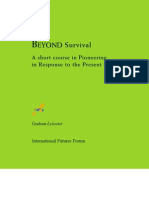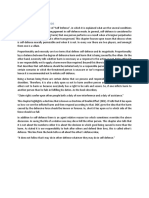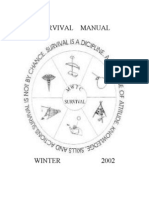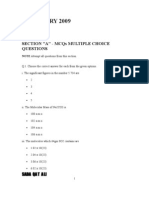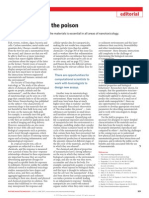Follow Me (Issue 11) 2013 02 01
Follow Me (Issue 11) 2013 02 01
Uploaded by
HQBn2dMarDivCopyright:
Available Formats
Follow Me (Issue 11) 2013 02 01
Follow Me (Issue 11) 2013 02 01
Uploaded by
HQBn2dMarDivOriginal Description:
Copyright
Available Formats
Share this document
Did you find this document useful?
Is this content inappropriate?
Copyright:
Available Formats
Follow Me (Issue 11) 2013 02 01
Follow Me (Issue 11) 2013 02 01
Uploaded by
HQBn2dMarDivCopyright:
Available Formats
S
Follow Me
Issue 11 01 FEB 2013
Ordinary Expressions on Warrior Honor
WHERE THE BUCK STOPS
You are standing post at a VCP and a car approaches at a rapid rate of speed. You follow all the procedures for escalation of force to get the vehicle to stop. By the time you level your weapon and take aim, you notice a family inside the car. In that moment you must make a decision; is taking out the car, including the family, necessary to protect you and those inside the wire you have taken an oath to protect? What are your options? What would you do? You are the leader of a Marine charged with a DUI and it is your responsibility to decide punishment at NJP or a Court Martial. You have a variety of powers at your disposal to prevent this from happening from brig time to removal of driving privileges. Anything you do will seriously affect that Marine in a negative way and may cause unintended consequences to your unit, but that punishment may save the lives of people you know in the future. Do you apply the maximum punishment to prevent a future disaster or do you go easy to save the Marine? As leaders, we encounter Doctrine of Double Effect situations. For this reason, we must make sure we know what it is and how it plays out in our context. We also need to ensure that Marines we lead understand this concept so that if they are in a short fused situation, they dont hesitate in completing a task that may involve life and death. Chaplain Ferguson 1st BATTALION, 9th MARINES
I knew what I was doing when I stopped the war ... I have no regrets and, under the same circumstances, I would do it again."
President Harry S. Truman
A Semi-Monthly Post Written and Reviewed by the Chaplains of 2D MARINE DIVISION
The Doctrine of Double Effect
HARD CHOICES
In the summer of 1945, President Truman faced a difficult and gut-wrenching decision: employ the most lethal weapon ever developed potentially killing a staggering number of people to end the war or commit US forces to an amphibious landing of Japan leading to an estimated 1 million dead service members. We learned of his decision on August 6th, 1945. What gut wrenching decisions do you face as a leader of Marines and Sailors? I write this article not to debate the merits of Trumans decision, but to introduce and discuss the Doctrine of Double Effect. Double Effect is difficult to swallow because it usually involves a lose-lose situation making us choose between two horrific outcomes. In Trumans case, it was hundreds of thousands of civilian casualties due to unknown effects of a new technology or the death of a million of his citizens he sent to war. When faced with situations involving double effects, we want to pass the buck up the chain of command as it is above my pay grade. Unfortunately, combat requires rapid decision making so hard choices are often unavoidable.
Aquinas reasoned that one could kill another human to save themselves based on the following conditions: 1. The act is in self-defense because saving a life is a good action. 2. The use of force is only that necessary to save your own life. 3. Your use of force is driven by selfpreservation, not by animosity towards the individual you encounter.1 Over time this idea developed to cover what we do as warriors in combat situations. In order for an action to satisfy Double Effect it needs to: 1. lead to an ultimate good, 2. be intended for good purposes from the start and the bad effect cannot be the reason for the action and 3. the good effect outweighs the bad action. Most of our military training implicitly teaches us to work within this framework, but it is still difficult to process and reconcile Double Effect in the heat of battle. Can good intentions overcome bad consequences? When have you acted with right intention to bring about a greater good in the face of hard choices? Loyal readers of Follow Me may notice a similarity between Double Effect and Utilitarian Ethics. There is a difference in the two concepts. Utilitarian Ethics begins with an assumption that all good comes from questionable intentions because each of us normally allows personal bias to enter our decision making equation. This prevents us from truly evaluating the good of both the intended and unintended consequences of such actions. Double Effect assumes we can make a moral choice based on intentional harm versus a side effect (e.g. the death of an individual in self-defense). Can we truly make unbiased moral choices? Is it possible?
1
INTENTIONS VERSUS CONSEQUENCES
So what exactly is Double Effect? It first appeared in the writings of Thomas Aquinas (the same thinker credited with the Theory of Just War) in the 13th Century. He was a Catholic priest trying to make sense of the uncomfortable side of war when one has to sacrifice someone or something for a greater good. Aquinas originally sought to determine the merits of homicidal self-defense, but his reasoning has since been applied to a multitude of disciplines, most notably our own profession of arms.
Thomas Aquinas, Summa Theologia, II-II, Q. 64, Article 7.
Can you say the same of your actions?
Concepts presented in this post may not express the views of all 2D MAR DIV Chaplains. To speak about issues in greater depth, please contact your unit Chaplain.
You might also like
- 100 Deadly Skills: COMBAT EDITION: A Navy SEAL's Guide to Crushing Your Enemy, Fighting for Your Life, and EmFrom Everand100 Deadly Skills: COMBAT EDITION: A Navy SEAL's Guide to Crushing Your Enemy, Fighting for Your Life, and EmRating: 4 out of 5 stars4/5 (8)
- Tom Clancy's The Division: New York Collapse (Excerpt)Document8 pagesTom Clancy's The Division: New York Collapse (Excerpt)ChronicleBooks50% (10)
- SAS Survival Handbook, Third Edition: The Ultimate Guide to Surviving AnywhereFrom EverandSAS Survival Handbook, Third Edition: The Ultimate Guide to Surviving AnywhereRating: 4.5 out of 5 stars4.5/5 (13)
- NEMA MG1 Motors and GeneratorsDocument709 pagesNEMA MG1 Motors and Generatorslam266100% (3)
- TM-725-15 (Free Edition)Document69 pagesTM-725-15 (Free Edition)Ron CollinsNo ratings yet
- 10.4 Thinking Errors Faulty Conclusions and CTT For Trauma-Related GuiltDocument6 pages10.4 Thinking Errors Faulty Conclusions and CTT For Trauma-Related GuiltJon NicholasNo ratings yet
- Prepared: A Manual for Surviving Worst-Case ScenariosFrom EverandPrepared: A Manual for Surviving Worst-Case ScenariosRating: 4 out of 5 stars4/5 (1)
- War On TerrorDocument21 pagesWar On TerrorLu LucileneNo ratings yet
- Core of SurvivalDocument16 pagesCore of SurvivalMoreMoseySpeed100% (3)
- Summary of George A. Bonanno's The End of TraumaFrom EverandSummary of George A. Bonanno's The End of TraumaRating: 3 out of 5 stars3/5 (2)
- DRRR Mod4 Disasters From Different PerspectivesDocument42 pagesDRRR Mod4 Disasters From Different PerspectivesMichele GosgolanNo ratings yet
- Chap 7 FinalDocument18 pagesChap 7 FinalGamidi Suneetha NaiduNo ratings yet
- 4899 Johnson Chapter 5Document28 pages4899 Johnson Chapter 5Michelle LeeNo ratings yet
- Discussion Board Prompts For UtilitarianismDocument6 pagesDiscussion Board Prompts For UtilitarianismScott SimmonsNo ratings yet
- Fight Like An Elite Soldier Win ANY Hand To Hand Combat 3Document30 pagesFight Like An Elite Soldier Win ANY Hand To Hand Combat 3Vincent Eliot100% (11)
- Student A - EoyDocument6 pagesStudent A - Eoyapi-381159165No ratings yet
- Crisis Management Looking Back and Looking AheadDocument9 pagesCrisis Management Looking Back and Looking AheadRezwan AfghanNo ratings yet
- Beyond SurvivalDocument28 pagesBeyond SurvivalfairflowNo ratings yet
- Does Ares Needs Athena's Owl? - Philosophy Behind The Men of War.Document7 pagesDoes Ares Needs Athena's Owl? - Philosophy Behind The Men of War.Alexis Dela CruzNo ratings yet
- Prepping for Survival in a Disaster: Be Tougher than the DisastersFrom EverandPrepping for Survival in a Disaster: Be Tougher than the DisastersNo ratings yet
- Atrocities of HumanityDocument17 pagesAtrocities of Humanityapi-308579399No ratings yet
- (03a) What Is The Scope of Civilian Immunity in WartimeDocument10 pages(03a) What Is The Scope of Civilian Immunity in Wartimebeserious928No ratings yet
- Moving From Unstable To Stable Peace: Kenneth E. BouldingDocument12 pagesMoving From Unstable To Stable Peace: Kenneth E. BouldingKupakwasheMtataNo ratings yet
- Chapter 1: Self DefenseDocument1 pageChapter 1: Self DefensePick ManNo ratings yet
- Sun Zi's Art of War Path To PeaceDocument12 pagesSun Zi's Art of War Path To Peacejupi cabacunganNo ratings yet
- Conquering Fear - Development of Courage In Soldiers and Other High Risk OccupationsFrom EverandConquering Fear - Development of Courage In Soldiers and Other High Risk OccupationsNo ratings yet
- Conditions of War and PeaceDocument112 pagesConditions of War and PeaceIri OhNo ratings yet
- Question Papers 2015 JWTDocument4 pagesQuestion Papers 2015 JWTArif AbbasiNo ratings yet
- Define Happiness EssayDocument6 pagesDefine Happiness Essayafabfetiu100% (2)
- L3 Reasons For WarDocument32 pagesL3 Reasons For WarSamuel OnwuchekwaNo ratings yet
- Biographical Narrative Essay ExampleDocument8 pagesBiographical Narrative Essay Exampledunqfacaf100% (2)
- DRRR Q1 Module 4 08082020Document19 pagesDRRR Q1 Module 4 08082020angelica jane andrada50% (4)
- Lizards Are Bad at Foreign PolicyDocument4 pagesLizards Are Bad at Foreign PolicyJeremy StrozerNo ratings yet
- Moral Obstacles An Alternative To The Doctrine of Double Effect Øverland 2014Document18 pagesMoral Obstacles An Alternative To The Doctrine of Double Effect Øverland 2014Carlos TrNo ratings yet
- The Suffering Pioneer 4 - Management VersionDocument8 pagesThe Suffering Pioneer 4 - Management VersionMartoos School of ThoughtNo ratings yet
- Weapons of Mass Destruction (WMD)Document2 pagesWeapons of Mass Destruction (WMD)leslie_adolfoNo ratings yet
- US Marine Corps - MWTC Winter Survival Course HandbookDocument187 pagesUS Marine Corps - MWTC Winter Survival Course HandbookDave Whitefeather100% (1)
- Survival - DIY SURVIVAL GUIDE For Beginners - Survival - The Best Strategies and Advice You Need To Know To Store Food and WaDocument42 pagesSurvival - DIY SURVIVAL GUIDE For Beginners - Survival - The Best Strategies and Advice You Need To Know To Store Food and WaVladimirYamabushiUrdešićNo ratings yet
- Fear of ChangeDocument8 pagesFear of ChangePoohbearrr :No ratings yet
- The Counterinsurgency Challenge: A Parable of Leadership and Decision Making in Modern ConflictFrom EverandThe Counterinsurgency Challenge: A Parable of Leadership and Decision Making in Modern ConflictNo ratings yet
- The Survivor Manual: An Official Book of the Hit CBS Television ShowFrom EverandThe Survivor Manual: An Official Book of the Hit CBS Television ShowRating: 5 out of 5 stars5/5 (1)
- Mental Endurance: How to develop mental toughness from the world's elite forcesFrom EverandMental Endurance: How to develop mental toughness from the world's elite forcesRating: 3 out of 5 stars3/5 (5)
- Spouses Day OutDocument1 pageSpouses Day OutHQBn2dMarDivNo ratings yet
- 13 September2013: HQBN 2mardivDocument1 page13 September2013: HQBN 2mardivHQBn2dMarDivNo ratings yet
- Hurricane Brochure PDFDocument2 pagesHurricane Brochure PDFHQBn2dMarDivNo ratings yet
- Maradmin 094-13 - Fiscal Year 2013 (Fy 13) Officer Retention Board Numbe...Document12 pagesMaradmin 094-13 - Fiscal Year 2013 (Fy 13) Officer Retention Board Numbe...HQBn2dMarDivNo ratings yet
- Catalina Wine Mixer FlyerDocument1 pageCatalina Wine Mixer FlyerHQBn2dMarDivNo ratings yet
- Division Divas: The HQBN 2dmardiv Spouse Kickball TeamDocument2 pagesDivision Divas: The HQBN 2dmardiv Spouse Kickball TeamHQBn2dMarDivNo ratings yet
- Follow Me (Issue 10)Document1 pageFollow Me (Issue 10)HQBn2dMarDivNo ratings yet
- The Great Muslim Scientist and Philosopher Imam Jafar Bin Muhammad Al SadiqDocument30 pagesThe Great Muslim Scientist and Philosopher Imam Jafar Bin Muhammad Al Sadiqwww.alhassanain.org.englishNo ratings yet
- Malaysia UBBL (OCR-ed)Document196 pagesMalaysia UBBL (OCR-ed)Huzaifah Bin KamarudinNo ratings yet
- Data ProcessingDocument4 pagesData ProcessingKwonyoongmaoNo ratings yet
- AQA Core 1 RevisionDocument15 pagesAQA Core 1 Revisionjake1731No ratings yet
- Usages TipsDocument5 pagesUsages TipsSatish ChobeNo ratings yet
- Post-Classical Philosophical CommentariesDocument32 pagesPost-Classical Philosophical Commentariesrock3tmnNo ratings yet
- Questions IHRMDocument3 pagesQuestions IHRMDivya SelvarajanNo ratings yet
- Reflective Essay 2Document4 pagesReflective Essay 2Sashi Kiran Reddy JakkulaNo ratings yet
- Enhanced Recovery After Surgery (ERAS) : Another MYTH or PARADIGM Shift!Document33 pagesEnhanced Recovery After Surgery (ERAS) : Another MYTH or PARADIGM Shift!Mahmoud IbrahimNo ratings yet
- Psychiatry Research: Dan Wang, Jun-Xia Zhai, Dian-Wu LiuDocument7 pagesPsychiatry Research: Dan Wang, Jun-Xia Zhai, Dian-Wu LiuEka FaridaNo ratings yet
- Chemistry 2009: Section "A" - Mcqs Multiple Choice QuestionsDocument51 pagesChemistry 2009: Section "A" - Mcqs Multiple Choice Questionsjazbia@scribedNo ratings yet
- Module 3 Learning Targets For Performance and ProductOriented AssessmentDocument20 pagesModule 3 Learning Targets For Performance and ProductOriented AssessmentPaul PaguiaNo ratings yet
- Acute Ischemic Stroke Management A ClinicalDocument7 pagesAcute Ischemic Stroke Management A Clinicaljasonongsp1992No ratings yet
- Managing Windows Server 2003 and Active Directory Best PracticesDocument35 pagesManaging Windows Server 2003 and Active Directory Best Practicesculymn78No ratings yet
- SAMPLE Mastercam X9 Instructor Guides MetricDocument19 pagesSAMPLE Mastercam X9 Instructor Guides Metricprem_mechenggNo ratings yet
- Self Reflective EssayDocument5 pagesSelf Reflective Essayapi-490406307No ratings yet
- 2-1393774-1 - P1 Relay V23026Document5 pages2-1393774-1 - P1 Relay V2302606111981No ratings yet
- Qualified Institutional Placement Vs Preferential Allotment: Choice of Seasoned Offering For Private Equity Placement in IndiaDocument6 pagesQualified Institutional Placement Vs Preferential Allotment: Choice of Seasoned Offering For Private Equity Placement in IndiaGedela BharadwajNo ratings yet
- Nano ToxicologyDocument1 pageNano ToxicologyMaría Florencia BorrelloNo ratings yet
- BalanceadoraDocument9 pagesBalanceadoracristhunneNo ratings yet
- India Tobacco Company Ltd. or "Itc LTD."Document26 pagesIndia Tobacco Company Ltd. or "Itc LTD."gurmeetsalujaNo ratings yet
- CSS GSA 2018 Solved PaperDocument20 pagesCSS GSA 2018 Solved PaperKhuleedShaikhNo ratings yet
- Masking LiquidDocument1 pageMasking LiquidPJNo ratings yet
- Exercise 1: Installing and Configuring Windows Server 2012 R2 Core MachineDocument15 pagesExercise 1: Installing and Configuring Windows Server 2012 R2 Core MachineAyoub AkrariNo ratings yet
- Energy Savings Calculator For Boiler ReplacementsDocument14 pagesEnergy Savings Calculator For Boiler ReplacementsSanjeev KachharaNo ratings yet
- Fis Feb KeyDocument13 pagesFis Feb KeyYanqing YangNo ratings yet
- Rudy Wong, Investment AdvisorDocument9 pagesRudy Wong, Investment AdvisorRikhabh DasNo ratings yet
- Brochure Valves PDFDocument36 pagesBrochure Valves PDFYahooNo ratings yet
- Latian Soal Kelas X SasDocument7 pagesLatian Soal Kelas X Sasxlaa27No ratings yet

















